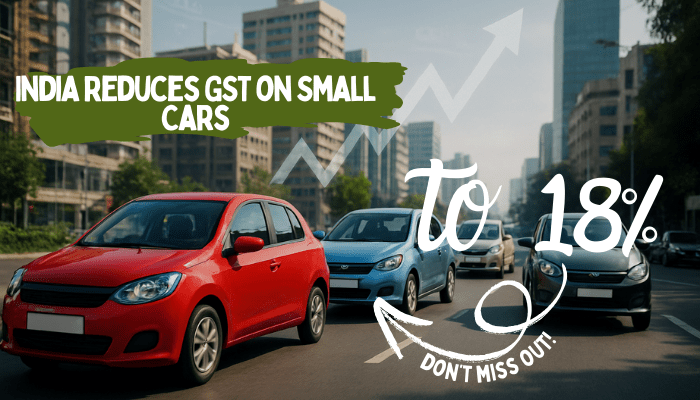India is about to undergo a big tax shift as the government intends to lower GST on small cars from 28% to 18%. The small car tax reduction is among a larger initiative to make taxes simpler and is already stimulating the auto market and stock prices.
What’s Changing?
The government desires to substitute the existing four-tier GST regime with a more easier two-tier regime. The basics, such as food and medicine, would be charged at 5%, while most other products, including automobiles, would have to pay 18%. The luxury goods, tobacco, and liquor would have to pay 40%. This amendment, particularly the GST on small cars, is designed to reduce taxation complexity for both the consumer and manufacturer.
Small Cars Get a Big Break
Small cars, petrol cars of up to 1200cc and diesel up to 1500cc, less than 4 meters long—already pay a GST of 28–31%. With the new small car tax reduction, prices may fall by 5–10%, reducing the cost of cars such as the Maruti Alto K10. Most anticipate that this GST on small cars will draw first-time customers and increase demand in the small car space.
Auto Stocks React
The decision sent India’s stock market soaring. Maruti Suzuki, Tata Motors, Hyundai, and others’ shares increased 2–9%. The stock of Maruti Suzuki increased almost 9%, leading the Nifty 50 index to post its highest growth in three months. Industry players appreciated the exemption in small car tax, stating that it would make the market more competitive and directly benefit customers.
Why This Matters
Sales of cars in India, particularly of small cars, declined during the last six years. Prices went up because of safety regulations and emission controls. Reducing GST on small cars is to boost sales, benefit producers, and help stimulate economic growth.
Who Benefits Most
Automakers such as Maruti Suzuki, Tata Motors, and Hyundai will benefit the most, as compact cars account for a huge chunk of their sales. The GST reduction on small cars will also benefit auto parts businesses and insurance companies, since GST on premiums could fall to 5%. Most importantly, consumers will benefit as a result of the GST on small cars.
What About Bigger Cars?
Big cars and SUVs won’t be getting a tax reduction. They will possibly come under the 40% “luxury items” tax. Hence, while luxury car prices are largely unchanged, the small car tax reduction ensures small cars are now cheaper.
Looking Ahead
The GST Council is expected to clear the changes by September, and the new rates will take effect from Diwali in 2025. If cleared, this GST amendment on small cars will simplify car buying, boost the auto sector, and streamline India’s tax regime, a benefit to buyers, producers, and the government.
Stay tuned with My Car Wisdom for the latest GST on small cars, auto news, price updates, and smart car buying tips.
Raja Yadav, the content writer at My Car Wisdom, brings a unique voice and style to our blog. With a knack for storytelling and a keen eye for detail, Raja ensures that every piece of content is informative, engaging, and easy to understand. His focus is on delivering high-quality articles that cater to both novice car owners and seasoned automotive enthusiasts.




